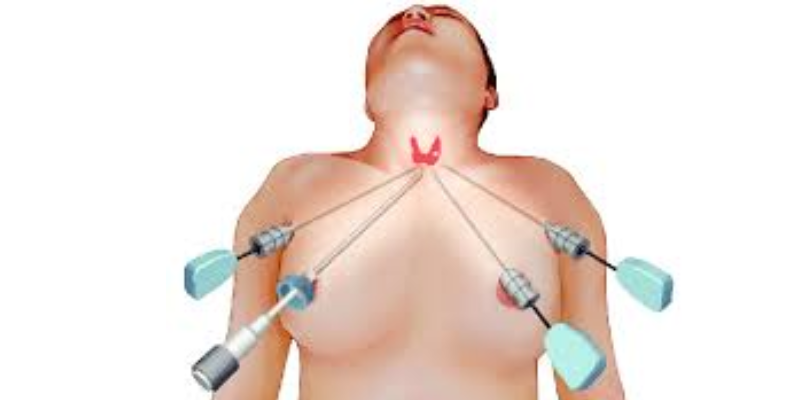
Thyroid & Breast Surgery
Thyroid and breast surgeries are specialized surgical procedures designed to diagnose, treat, and manage conditions affecting the thyroid gland and breast tissue. The thyroid gland, located in the neck, plays an essential role in regulating metabolism and hormone production, while the breast tissue is prone to both benign and malignant growths. Surgery is often required when there are nodules, tumors, cysts, or other abnormalities that cannot be effectively treated with medication alone. With the advancement of modern surgical techniques, thyroid and breast surgeries are now safer, minimally invasive in many cases, and associated with quicker recovery and improved outcomes.
Causes and Conditions Treated
Thyroid and breast conditions may develop due to genetic, hormonal, or lifestyle-related factors. Some of the common causes and medical conditions that may require surgical treatment include:
Thyroid Conditions:
– Thyroid nodules or goiter causing difficulty in swallowing or breathing
– Hyperthyroidism not responding to medication
– Thyroid cancer
– Suspicious lumps or abnormal biopsy results
– Enlarged thyroid (multinodular goiter) causing cosmetic or functional issues
Breast Conditions:
– Breast lumps (benign or malignant)
– Fibroadenomas or cysts
– Breast cancer
– Nipple discharge or suspicious changes
– Painful or recurrent breast infections
– Cosmetic or reconstructive needs following cancer treatment
Symptoms That May Require Surgery
Not all thyroid or breast abnormalities require surgical treatment. However, surgery may be recommended if the following symptoms are present:
Thyroid Symptoms:
– Noticeable swelling in the neck
– Persistent hoarseness or voice changes
– Difficulty breathing or swallowing
– Rapidly growing thyroid nodules
– Overactive thyroid with complications
Breast Symptoms:
– A lump in the breast that persists or grows
– Painful or tender mass not resolving with treatment
– Bloody or unusual nipple discharge
– Skin dimpling, redness, or thickening
– Abnormal findings on mammogram, ultrasound, or biopsy
Diagnosis
Diagnosis for thyroid and breast conditions involves multiple steps. For thyroid disorders, evaluation may include physical examination, blood tests to check thyroid hormone levels, ultrasound imaging, fine-needle aspiration (FNA) biopsy, and sometimes CT or MRI scans. For breast conditions, diagnostic methods may include clinical breast examination, mammography, ultrasound, MRI, and biopsy to determine whether the lump or abnormality is benign or malignant. Based on the diagnosis, surgery may be recommended either as a therapeutic procedure or as part of cancer treatment.
Types of Thyroid & Breast Surgeries
Depending on the diagnosis, different surgical approaches are used. Common procedures include:
– Thyroidectomy: Complete or partial removal of the thyroid gland, often performed for cancer, large goiters, or hyperthyroidism.
– Lobectomy: Removal of one lobe of the thyroid gland when nodules or localized growths are present.
– Lumpectomy: Removal of a breast lump and a small margin of surrounding tissue, usually for benign lumps or early-stage cancer.
– Mastectomy: Partial or complete removal of one or both breasts, typically recommended for breast cancer or high cancer risk.
– Breast Reconstruction: Rebuilding the breast shape after mastectomy, using implants or tissue from other parts of the body.
– Sentinel Lymph Node Biopsy / Axillary Dissection: Removal of lymph nodes to check cancer spread in breast cancer cases.
Recovery and Post-Surgery Care
Recovery depends on the type and extent of surgery performed. Thyroid surgery patients may need to take lifelong thyroid hormone replacement if the gland is removed entirely. Voice changes or temporary swallowing difficulties may occur but usually resolve with time. For breast surgery, recovery may take a few days to weeks depending on whether a lumpectomy or mastectomy was performed. Pain management, wound care, physical therapy, and emotional support are key aspects of recovery. Regular follow-ups are important to monitor hormone balance (thyroid cases) or cancer recurrence (breast cases).
Benefits of Thyroid & Breast Surgery
These surgeries provide significant health and quality-of-life benefits, such as:
– Removal of cancerous or suspicious growths
– Relief from pressure symptoms like difficulty breathing or swallowing
– Improved cosmetic and functional outcomes
– Accurate diagnosis through biopsy and tissue removal
– Prevention of cancer spread in early detection cases
– Enhanced self-confidence and emotional well-being after treatment

